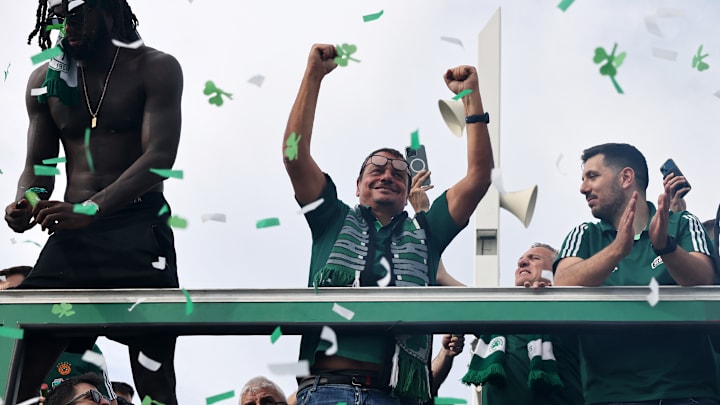As the EuroLeague enters its 25th anniversary season, its future is far from clear. It’s not going bankrupt — like the British Basketball League — but its fight for relevance in a rapidly expanding competitive landscape is increasing in difficulty every season, for a number of reasons.
The continued rise of the NBA’s salary cap has the minimum deal for a five-year player roughly in the same ballpark as a top-10 EuroLeague salary. That has led to more players betting on themselves in the NBA, such as Guerschon Yabusele did with the Philadelphia 76ers after his strong showing at the Olympics.
The advent of NIL money has led to the pilfering of young talent in European basketball clubs. Egor Demin, Fedor Zugic, and plenty of others left Europe for NIL deals this summer. Karim Lopez left Joventut Badalona — one of Europe’s legendary development clubs — for Australia’s NBL Next Stars program.
EuroLeague Commercial Assets is currently valued at roughly $1 billion, according to EuroHoops, and is looking to sell a minority stake. That puts the league as a whole at a lower valuation than all 30 NBA teams with the New Orleans Pelicans being the lowest at $2.72 billion, according to HoopsHype.
In the face of growing disparity, EuroLeague is persevering and continues to hunt for solutions. The political instability in Israel and Russia is not helping. CSKA Moscow continues to be involved in discussions about the future of the competition while their team remains banned from it. Maccabi Tel Aviv may be looking at another season with zero home games.
The glass-half-full view is EuroLeague will finally have a presence in the Paris market with newcomers Paris Basketball joining the competition after lifting the 2024 EuroCup trophy. EuroLeague has long desired a presence in London and Paris. While London seems to be a ways away, Paris is finally here, and Berlin continues to hang on by a thread as ALBA Berlin is destined for another season at the bottom of the standings.
EuroLeague is introducing a salary cap system as well, hoping to maintain competitiveness and stability in the current environment with a financial model which often helps protect owners from themselves.
Finally, there is the question of Dubai and expansion to the Middle East with significant upfront investment. Saudi Arabia’s SURJ Sports Investment has entered the race to buy a minority stake in the EuroLeague elite basketball competition, according to the Financial Times (FT). And while the heavy amount of pushback from longtime EuroLeague fans seemed to give pause to the immediate addition of a team from Dubai, the door is obviously open. Dubai BC were able to buy into the Adriatic League, assemble a solid roster this summer, and even defeated Crvena Zvezda in their opener.
Should they win their domestic title, they will have a path to a EuroLeague wild card berth or EuroCup slot sooner rather than later. BC Partners —who owns United Media which is the TV rights shareholder of the EuroLeague in the Balkans, including Greece and Serbia— has also entered exclusive talks to buy a minority stake in ECA. This would cut out Saudi Arabia’s SURJ Sports Investment according to EuroHoops.
While what is happening behind the scenes is murky and a far cry from the EuroLeague many have fallen in love with, the on-court product is the same and set up for its best season in recent memory thanks to what has always been core to this competition's success: rivalries.
Panathinaikos lifting their first EuroLeague title in over a decade drove Olympiacos to make some big swings this offseason on Sasha Vezenkov and Evan Fournier, as well as proven EuroLeaguers Tyler Dorsey, Keenan Evans, and Luca Vildoza. Panathinaikos responded accordingly by adding Lorenzo Brown and Cedi Osman, making it clear they won’t settle for anything less than back-to-back titles.
The Greek derby will be prime viewing once again this season, and so will Belgrade’s. Partizan responded to last season’s embarrassment by building a new roster that includes Aleksej Pokusevski, Carlik Jones, Sterling Brown, Isaac Bonga, and plenty more high-level talent. Crvena Zvezda was only a step above their rivals last season and brought in new faces as well. Codi Miller-McIntyre, Isaiah Canaan, and Nikola Kalinic provide depth at every position, and Zvezda hope that is enough to make the play-in — or at least beat Partizan.
Although Real Madrid came up short in last season’s final, they rampaged through domestic play. Barcelona and Baskonia are not happy with the gap between themselves and Real. Baskonia brought in Pablo Laso, a former player for the club and EuroLeague championship-winning coach with Real Madrid to help them make a leap. They will need more than Laso’s leadership, which is why they extended stars Markus Howard and Tadas Sedekerskis. If someone steps up, Baskonia could make noise.
Barcelona dismissed Roger Grimau shortly after season’s end, replaced him with Joan Pennaroya — who began last season as Baskonia’s head coach — and signed Kevin Punter, Chimezie Metu, Juan Nunez, Justin Anderson and others who they believe can help them compete with Real. That seems unlikely, but the battle will be entertaining regardless.
And of course, there is Fenerbahce and Anadolu Efes Istanbul, Both clubs have lifted the EuroLeague trophy in the last decade and want to again. Fenerbahce brought in Wade Baldwin IV and Bonzie Colson to team with Nigel Hayes-Davis, arguably the best forward in EuroLeague. The trio is good enough to beat anyone.
Efes added Stanley Johnson, Jordan Nwora, and Vincent Poirier around Shane Larkin and Darius Thompson. This is their most expensive squad in recent memory, and expectations are high.
While the Euroleague’s future will likely look remarkably different from what it has been for the past 25 years, the on-court product will retain everything that makes it uniquely special: rivalries, passion, talent, and a week-to-week level of importance that the NBA does not come close to matching.
